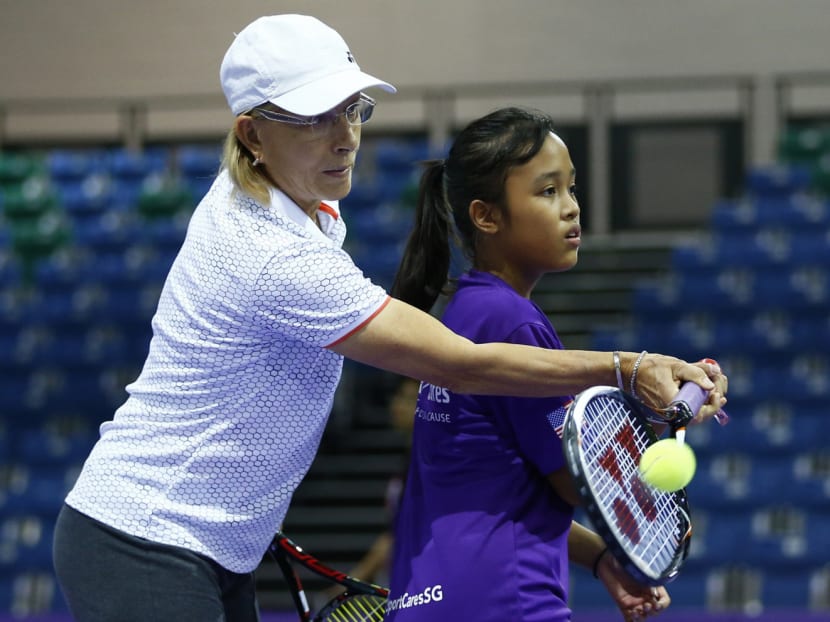Age of teenage Grand Slam winners is over, says legend Navratilova
SINGAPORE — It has been 12 years since a teenager last won a Grand Slam on the women’s professional tennis tour, with that honour belonging to Russia’s Svetlana Kuznetsova, who secured the 2004 US Open title at the age of 19.

Martina Navratilova believes there will no longer be another teenage Grand Slam winner. Photo: Lim Yong Teck/SportCares
SINGAPORE — It has been 12 years since a teenager last won a Grand Slam on the women’s professional tennis tour, with that honour belonging to Russia’s Svetlana Kuznetsova, who secured the 2004 US Open title at the age of 19.
Her victory came just a month after a 17-year-old Maria Sharapova had won her first Grand Slam title at Wimbledon.
It is the same in the men’s game as well, with former world No 1 Rafael Nadal the last teenager to have won a Grand Slam with his 2005 French Open victory when he was 19.
Indeed, current women’s world No 1 Angelique Kerber won her only two Grand Slam titles — the Australian Open and the US Open — to date just this year at the age of 28.
However, this statistic does not come as a surprise to retired women’s tennis star and former world No 1 Martina Navratilova.
The 60-year-old — who won her first Grand Slam title at the age of 21 — pinpoints the increasing physical demands of the modern game, coupled with the age-eligibility rules that prevent players from undertaking a full-time playing schedule till they turn 18, as the two main reasons that the game will not see another teenage Grand Slam winner.
“Firstly, the game (nowadays) is much tougher, everybody is hitting the ball much harder so you have to be physically developed to be able to compete,” explained Navratilova, who was speaking on the sidelines of yesterday’s Women’s Tennis Association (WTA) Play with the Stars & Play for Change charity fundraiser, which raised S$25,000 for the SportCares Foundation.
“But also, the stipulation where you cannot play a full-time schedule until you’re 18 — the age eligibility rule — might be a little too strict, because it delays the development of the players. You can only get better by playing against the top players. If you don’t play those matches, it won’t help you develop as quickly no matter how much you practise.
“Perhaps they might want to loosen the rules a little bit, and allow the players the flexibility to play a bigger schedule earlier on.”
However, Navratilova admitted that the age eligibility rule, which was first introduced in 1994 and has since undergone several revamps over the years, helps to protect a player’s career lifespan.
After all, former teenage proteges such as Steffi Graf and Martina Hingis suffered from burnout and eventually retired early. Graf retired at the age of 30, while Hingis initially retired from the game at age 22 before making her comeback two years later.
“The players now are staying healthier and having longer careers,” said Navratilova. “And it really shouldn’t matter whether you win your first Grand Slam at 18 or 21, as long as you have over 10 great years on the tour.
“The problem previously was that the parents want their kid to be ready for the tour at 14, but that’s impossible. So the kids were getting burnt out emotionally and physically.
“The rules work to counter that, but it delays their development so you’re not going to see a teenage champion any more because of this.”
Navratilova also believes that with Serena Williams at the tail-end of her career, a new generation of tennis stars are now ready to fight to establish themselves as a powerhouse of the game.
“Since last year, I’ve thought the gap was closing and the new generation has started playing better and are nipping at the heels of the previous one,” she said.
“Sure enough, it happened that Kerber is No 1 at the end of the year. She’s not exactly one of the young ones, but she’s a new champion and it’s well-deserved.
“Now you have the youngsters definitely playing some great tennis, and any of them could be No 1 at the end of next year.”





